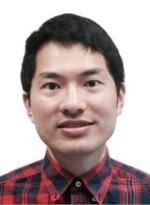Jeffrey S. Case, assistant professor of mathematics, is a geometric analyst interested in global problems in Riemannian, Lorentzian, conformal, and CR geometry. He uses ideas from conformal geometry to better understand CR geometry and smooth metric measure spaces. He applies these ideas to study optimization problems involving the “shape” of manifolds and to study inequalities important in differential equations. Prior to joining Penn State, Case was a National Science Foundation Postdoctoral Fellow at Princeton University from 2010 to 2013 and an instructor in mathematics at Princeton from 2011 to 2015. He earned master's and doctoral degrees in mathematics at the University of California, Santa Barbara in 2007 and 2010, respectively, and a bachelor’s degree in mathematics and computer science at Minnesota State University in 2005.

Jack Huizenga, assistant professor of mathematics, focuses his research on algebraic geometry. He studies the geometry of curves and surfaces, with a particular emphasis on moduli spaces of vector bundles and interpolation-type problems. Prior to joining the faculty at Penn State, Huizenga was a research assistant professor and National Science Foundation Postdoctoral Fellow at the University of Illinois at Chicago from 2012 to 2015. He earned master's and doctoral degrees in mathematics at Harvard University in 2008 and 2012, respectively, and a bachelor's degree in mathematics at the University of Chicago in 2007.

Jesse R. Lasky, assistant professor of biology, studies the processes that generate and maintain biodiversity. His research has applications in conservation and agriculture. He is particularly interested in the causes of genetic variation across the geographical range of a species and how this variation changes over time. In particular, he is interested in how plant populations adapt to local environmental conditions and how that adaptation is affected by species interactions. Prior to joining the faculty at Penn State, Lasky was an Earth Institute Fellow from 2012 to 2014 and a postdoctoral researcher from 2014 to 2015 at Columbia University. He earned a doctoral degree in ecology, evolution, and behavior at the University of Texas at Austin in 2012 and a bachelor's degree in biology at Kenyon College in 2004.

X. Lance Lian, assistant professor of biomedical engineering and biology, focuses his research on understanding human development and disease by applying the principles of developmental biology to experiments with human-derived stem cells, and by experimentally editing the genetic code. In addition to gaining basic knowledge of human development at the cellular and- molecular level, Lian's research has application in the development of therapies to treat degenerative diseases like spinal-cord injury, heart disease, and diabetes. Lian also plans to study stem-cell-derived immunotherapy as a cancer treatment. Before joining the faculty at Penn State, Lian was a postdoctoral fellow at Harvard University from 2012 to 2014. He earned a doctoral degree in chemical engineering at the University of Wisconsin-Madison in 2012 and a bachelor's degree in bioengineering at Zhejiang University in China in 2006.

Lynn Lin, assistant professor of statistics, develops Bayesian methods and computational tools for classification, selection of subgroups of variables, detection of rare events, and the visualization of highly complex data. She applies her research to datasets of high-throughput single-cell biological research on immunology and vaccines. Prior to joining the faculty at Penn State, Lin was a postdoctoral fellow at the Fred Hutchinson Cancer Research Center from 2012 to 2015. She earned a doctoral degree in statistics at Duke University in 2012, and bachelor's and master's degrees in statistics at the National University of Singapore in 2007 and 2008.

Mikael C. Rechtsman, assistant professor of physics, uses both experimental and theoretical approaches to understand photonics, the science of light. In particular, he is interested in the new field of “topological photonics” with the goal of allowing light to be transported through complex materials—where normally random scattering would massively disrupt its flow. Rechtsman's research can be applied to devices that transport information using photons and in the development of extremely small optical components used across the telecommunications industry, such as waveguides, splitters, and optical diodes. Prior to joining the faculty at Penn State, Rechtsman was an Azrieli Postdoctoral Fellow at Technion Israel Institute of Technology from 2010 to 2015 and Courant Instructor at New York Univeristy's Courant Institute of Mathematical Sciences from 2008 to 2010. He earned a doctoral degree in physics at Princeton University in 2008 and a bachelor's degree in physics at the Massachusetts Institute of Technology in 2003.

Xin Zhang, assistant professor of chemistry and of biochemistry and molecular biology, studies how the environment of the cell influences the folding of proteins into their proper three-dimensional structures. Zhang aims to develop tools that can monitor the stresses and cellular machineries within the cell that can alter the ways in which a protein can fold. His research also has application in the development of diagnoses and therapies for human diseases rooted in defective protein folding. Prior to joining the faculty at Penn State, Zhang was a research associate at the Scripps Research Institute, California. He earned a doctoral degree at the California Institute of Technology in 2010, a master's degree at the Dalian Institute of Chemical Physics of the Chinese Academy of Sciences in 2004, and a bachelor's degree at the University of Science and Technology of China in 2001.
